'Beauty And The Beast' Director Bill Condon On The Changes He Made To Disney's Classic, Deleted Scenes & More [Interview]
Last week, I had the opportunity to sit down filmmaker Bill Condon to talk about his live-action adaptation of Disney's Beauty and the Beast. We discussed the changes he made to the Disney classic, hiding Universal horror homages in his work, the film's incredible production design, and a taste of the deleted scenes fans can expect on the inevitable home video release. Read our full Bill Condon interview below!
Peter Sciretta: Hi.Bill Condon: Good to meet you. How are you?Good. How are you?
I'm very good, thank you.
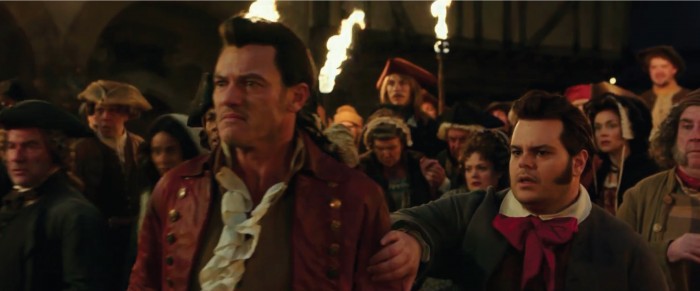 I have to ask you about Universal horror nods because you usually include some Easter eggs in your films.
I have to ask you about Universal horror nods because you usually include some Easter eggs in your films.
Oh, God yes. Yeah. No, I mean, certainly the mob song with everyone with their torches, it's straight out of Frankenstein, you know. And obviously Bride of Frankenstein is a favorite movie of mine. There's a great Una O'Connor scene in that. She has a hat that's very similar to a hat that Cothilde, the fish wife, the fish monger wears in the celebration at the end. You know, little touches like that. But I think in general it's the treatment of the monster, right? The sort of poetic, misunderstood monster that really was James Whale's invention, you know. That's in that film. And I think it's something that it's just a through line from that to The Phantom of the Opera, the Beast, all of these other misunderstood hairy things.
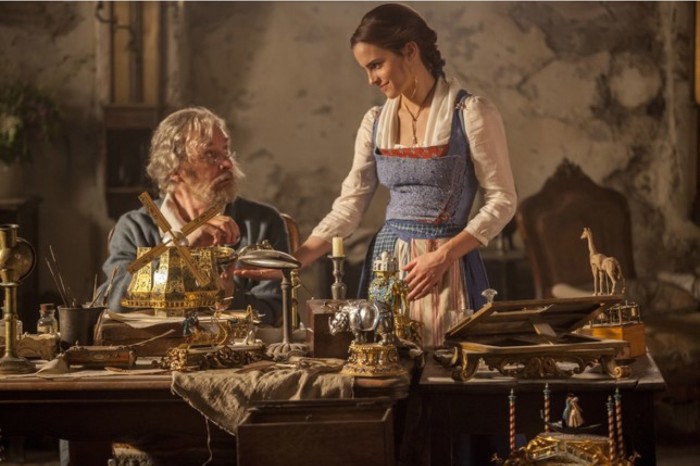 I want to talk a little bit about the choices that you made that go off from the original. I think the most obvious one is the mother subplot.
I want to talk a little bit about the choices that you made that go off from the original. I think the most obvious one is the mother subplot.
Yes, right.
Can you talk about what the decision was to bring that into the movie and why?
Yeah. I think it all comes from the basic kind of challenge, which is translating this into really what's a new medium. So that you have characters, who in this case, Belle has to credibly fall in love with the Beast. Which means we have to sort of make people feel that these two characters are meant only for each other. Which means they have to be less archetypal than they are in the animated film. They have to become more individual.
So to me, that basic question when we find Belle, how did she and her father wind up here? And you start to explore the idea that there was a trauma in the past that the father, that Maurice, has not spoken about. That led him to hide, to kind of disappear from the world, thinking he can get away from any kind of danger. So he went to a place where they don't belong. And he won't talk about it. So he's shut down about it.
So already just to beg him to tell her, tell him something to tell her something about her mother. Already you see that's a human relationship. And then, specifically, the fact that their mother...she's inherited from her mother this incredible sense of fearlessness, strength. But the picture's incomplete. And that, in the course of the movie, the fact that the Beast while being her captor also gives her the chance to discover this thing. It is an extra connection that they have.
And then when she's leaning over his body at the end and says, please don't leave me, I think you feel that what the loss that she suffered that's still so unresolved of her mother and his, the loss of his mother and the way that that left him kind of in the clutches of a terrible father that they both understand each other in a way that probably no one else around them would. Right? So that was the idea.
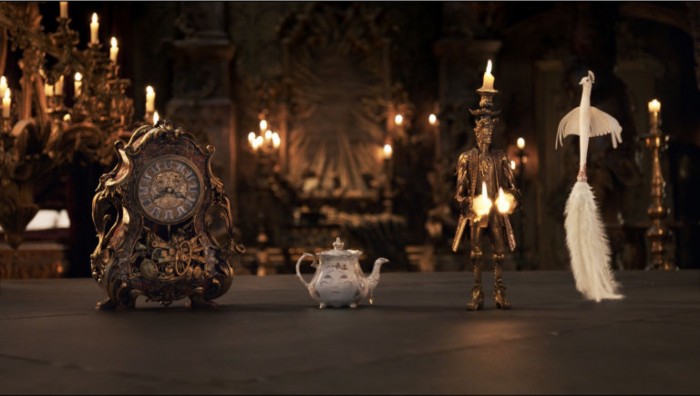 It's also interesting that you give a reason why all the people in the castle are cursed as well as is Beast.
It's also interesting that you give a reason why all the people in the castle are cursed as well as is Beast.
Well, again, it just made it more interesting to think that in a way they are...they see themselves as culpable. You know, that somehow you want to answer the question, okay, you sort of tried to answer the question of how did Belle and Maurice wind up here? How did that prince wind up being get to the point where he was so monstrous that he was worthy of being cursed, you know? And part of it is this more complicated relationship with the people who raised him. Even Mrs. Potts bears some responsibility. And that again, it starts to seem like you're in an adult world or more nuanced real world.
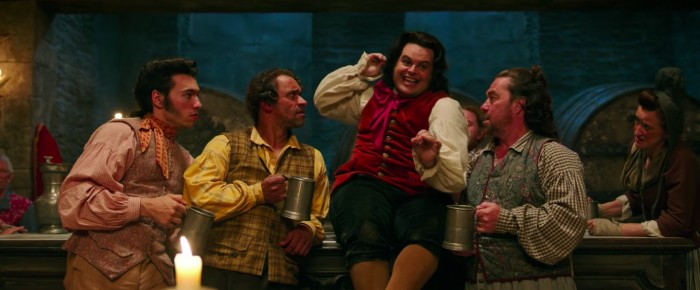 Yeah. You've talked a little bit about the choice of making Josh Gad's character gay. And it's done beautifully. And he steals the movie.
Yeah. You've talked a little bit about the choice of making Josh Gad's character gay. And it's done beautifully. And he steals the movie.
Oh, that's interesting.
I want to know how did that come about? Was that in the scripting phase? Was that something that was kind of developed on set with Gad? Or like...
Yeah, it was just, you know, it's so weird. I feel like it's such, I almost don't wanna even like get into it because I feel like it's such a minor, delicate surprise in the movie.
Yeah, I know, it's so subtle.
It's so subtle. Yeah. It's not worth it, you know what I mean? It was just things that happened, really. And it was always meant to be just this little smile, you know? I think it's been overstated.
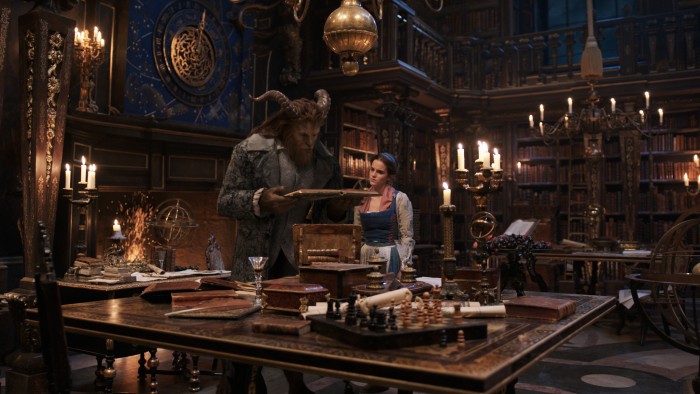 One of the things that I think anybody seeing this film will be blown away is the production design.
One of the things that I think anybody seeing this film will be blown away is the production design.
Yeah, Sarah Greenwood is great.
If it does not get nominated... Like I know it's early in the year to say that but really, seriously, if it doesn't...
Yeah, that's funny. Yeah. Well, I mean, it was a thrill to get Sarah. I tried before to get her on a movie and it was a thrill to finally work with her. And I have to say out of our, you know, our first meetings we kind of mutually decided that we were gonna set it specifically in the beginning of the 18th Century. It wasn't gonna be a kind of mythical fairy tale version of France. It was gonna be set at the moment when the story was written.
And it seems to me out of that idea came everything, because then you start to look at objects from that period and you start to see they're so ornate that yes, you could discern lips and a face and all those things in that candlestick or you see how incredibly decorated a teapot is in that period, you know, painted and beautiful filigree. So throughout, it was her notion that there was a sort of cancer growing through that castle and that kind of it started in the Beast's lair and spread from there.
And there were rooms that were still untouched. So that idea of the curse creating an architecture that defied gravity. If you look at those columns, they're gone and that it's almost as though all the right angles have melted into curves. And there's no way in which in a way that castle should still be standing. I thought that was a really inspired idea.
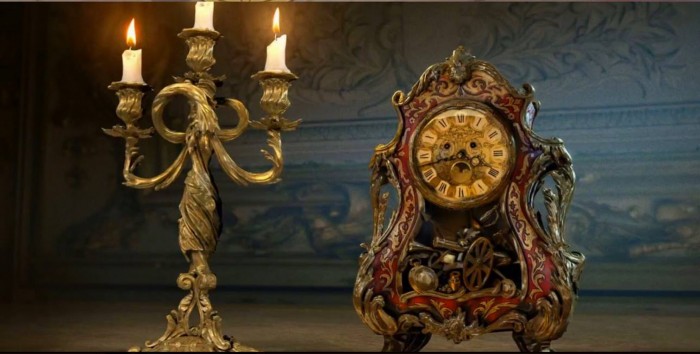 When this comes on Blu-ray or DVD is there any like deleted scenes or–?
When this comes on Blu-ray or DVD is there any like deleted scenes or–?
Sure, absolutely. Yeah.
What is something that people can look forward to?
Well, there was something that I think turned out to be probably too low humor. You know, the humor was probably too low for where we ultimately wound up. But there was a thing that I loved where your favorite character, LeFou, gets away from the battle, which he doesn't want to be a part of at all [and] sort of hides in a closet and it turns out to be a water closet. And Monsieur Toilette attacks him.
And then it was a wonderful cameo, which we kept secret, which is that it was Steven Merchant in the end and in all those reunions, he comes out and you realize that he's absolutely traumatized 'cause he spent 10 years as a toilet. And he has and he and Josh had this priceless little scene together.
Well, that's great. Thank you very much.
Thank you.
